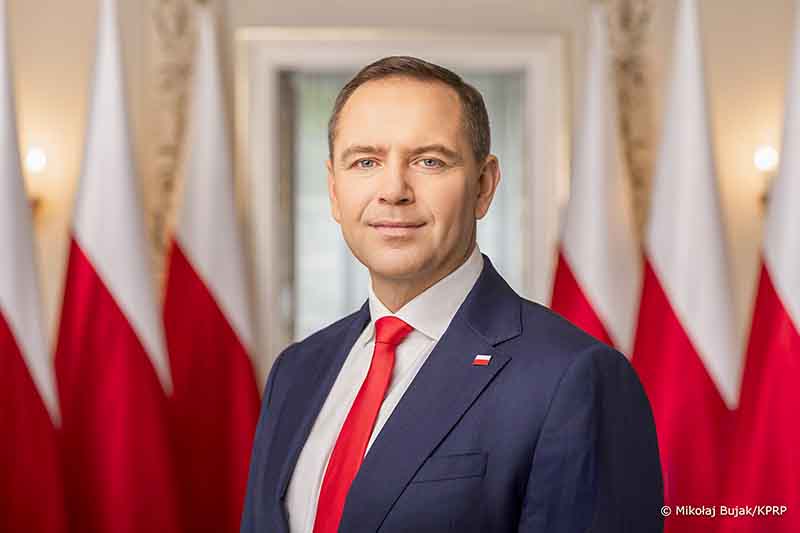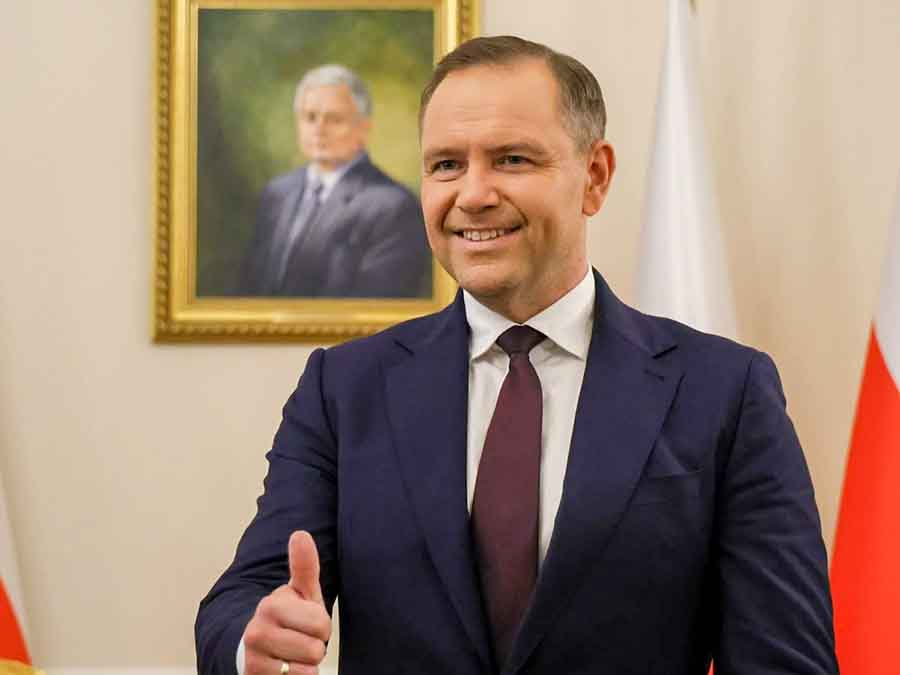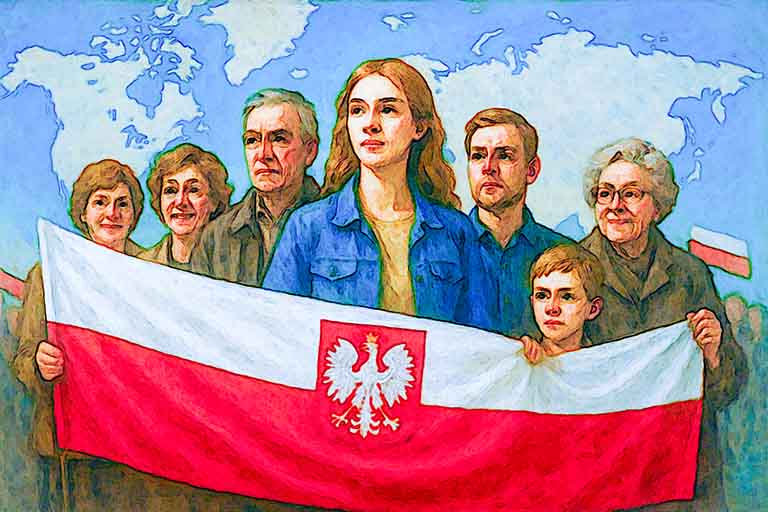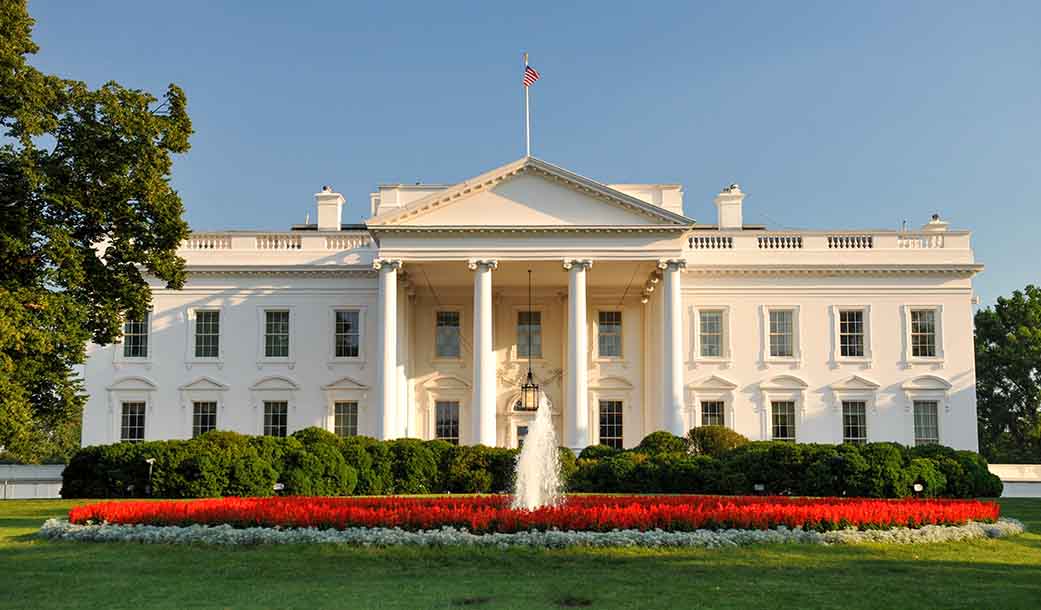You can read the first part of this article: Will President Karol Nawrocki Restore the Polish Diaspora to Poland? – Part I
The new political arrangement, with President Karol Nawrocki as its architect, will likely be based on a broad coalition of various parties, clubs, and groups. This new arrangement presents a remarkable opportunity: the genuine inclusion of the Polish diaspora in the public life of the country's Polish diaspora, which for decades has remained on the margins of national debate, despite possessing—especially here in the United States—enormous potential, both human and financial.

Karol Nawrocki, President of the Republic of Poland (Source: KPRP)
Polonia – 1/3 of the Polish nation, and the political will in Warsaw
If the Polish elites in Warsaw want to have a well-organized Polish diaspora in the United States and around the world, they should:
- The time has come to implement the idea of incorporating into the Constitution the fact that one-third of the Polish nation lives outside the country's borders. There are approximately 60 million Poles living worldwide, of whom approximately 20 million are Polish diaspora and Poles living abroad. They should finally be recognized as an integral, valuable part of the national community—as an added value, not an unnecessary sideline.
- The Polish diaspora must regain full civil rights. It is essential to reinstate postal voting and create a special constituency for the Polish diaspora, allowing Poles living abroad to elect their representatives to the Sejm and Senate. Their voices must be heard and represented in the Polish parliament.
- We need an efficient and modern system for activating the diaspora—both in the political life of their countries of residence and in relations with the Polish state. It is essential to create an information system for Polish citizens and people of Polish descent in every consular district. Consulates must become dynamic centers of Polish community life—they cannot be places where one "sits behind a desk and waits for a petitioner." We need to reach out to people, take action, organize, and educate.
- We need to build a conscious and integrated diaspora. This means, among other things, making it easier for children born abroad to obtain Polish passports, intensifying the issuance of Polish Cards for citizens of other countries with Polish roots, and – crucially – finally, real and effective measures to repatriate Poles and their descendants.
- Today, as much as 95% of the Polish diaspora in the US doesn't speak Polish, and their main source of information about Poland is the American media. This is a huge challenge, but also an opportunity. We must prepare attractive information, educational, cultural, and media offerings for them. This segment of the diaspora can become a powerful instrument in implementing Polish foreign policy—provided that Poland nurtures and encourages it.
- We need professional debates on Poland-Polish relations. Shedding hectolitres of tears by Polish diaspora communities is an ineffective strategy – no one listens to their cries anymore. Instead, we need a vision, a plan, and action. Let us build a national community not only "from the sea to the Tatra Mountains," but – as the master Jan Pietrzak sings – "from Chicago to Tobolsk."
- Pro-Polish lobbying (its goals in countries strategic to Poland include supporting Polish foreign policy, permanently promoting Poland abroad, maintaining historical narratives, supporting and promoting Polish business, science, and culture), connectivity, or networking; creating a global strategic communications network; strategic flows and connections are key elements shaping the global future; a Polish success strategy should consider the Polish diaspora as a crucial factor in the success of the Polish strategy. Connecting the "soft power" network—that is, Poles in Poland—with the 20 million-strong Polish diaspora should be a key priority for every Polish government.
- Organize task forces supporting Poland's key goals, such as energy, border security, education, and new technologies. Invest in the development of leaders – supporting Polish Americans on their path to political positions at various levels. Build academic and cultural ties – promote student exchange, support Polish language learning, and connect the Polish diaspora with Polish think tanks and institutions.
- Create an Investment Initiative for Diapora – enabling the financial involvement of the Polish diaspora in the development of the country.
- Appoint a plenipotentiary for diaspora affairs (vice minister at the Ministry of Foreign Affairs) with an appropriate mandate and budget, coordinating international activities.
- Organize an annual US-Poland Strategic Forum in a major diaspora center, such as Chicago, Washington, or other centers.
- The Polish American community has made undeniable contributions to building independence. We want this knowledge to finally reach Polish society. We demand a proper historical narrative. Just as the First Cadre set off from Oleandry, so too did volunteers for the Blue Army set off from Niagara-on-the-Lake. We, too, have made enormous contributions to the fight for independence. Our heroes – the Polish diaspora – also deserve respect and a rightful place in Polish history.
"The defense of Poland is our most sacred and important duty today."
These words were spoken in 1944 by the first president of the Polish American Congress, Karol Rozmarek—a Polish-American who had never been to Poland. Today, the situation compels us to once again put these words into action.
I would like to remind you that on December 10, 2021, the Russian Ministry of Foreign Affairs issued a statement on the "terms of the future dialogue between the Russian Federation, the United States, and other Western countries" on European security. Russia demanded that the United States block further eastward expansion of the North Atlantic Treaty Organization and refrain from admitting countries that were previously part of the Union of Soviet Socialist Republics to the pact.
The Americans were also to guarantee that neither they nor NATO would conduct any military activity, install bases, conduct exercises, or supply weapons to these now-sovereign states on the territory of the former Soviet republics. The Kremlin also demanded restrictions on the sovereignty of more than just the former Soviet republics. The text of the "agreement" that Russia sought to impose on the North Atlantic Treaty Organization included a commitment that the countries that joined NATO on May 27, 1997 (the year the NATO summit with Russia was held) "will not deploy their armed forces and weapons on the territory of any other European state" unless Russia consents.
With this ultimatum, the Russians attempted to impose their vision of world order on the West, and above all, on the United States. This was the case at the Congress of Vienna in 1815 and at the Yalta Conference 76 years ago, when, over the heads of smaller states and nations, hegemons defined the world order according to their own interests. The ultimatum was intended to deprive NATO of the possibility of further expansion and reduce the Alliance's military potential in Central and Eastern Europe to its pre-1997 state.
NATO's deterrence policy has failed. Russia launched a military invasion of Ukraine on February 24, 2022, escalating the war that had been ongoing since 2014. The goal of this war is Putin's imperial dreams of recreating a "Soviet Union 2.0." The war in Ukraine continues, and NATO is committed to supporting Ukraine. However, a plan to defend NATO's eastern flank is practically nonexistent, as noted by Estonian Prime Minister Kaja Kallas, who criticized NATO's current plan back in June.
Kallas said that NATO's current defense plans for Lithuania, Latvia, and Estonia assume they will be destroyed and then liberated after 180 days. "This would mean the complete destruction of these countries and our culture." Considering the current military operations in Ukraine, which include the complete destruction of energy infrastructure and residential buildings, schools, and hospitals, this would mean the annihilation of the Baltic states. This is despite the Russians committing war crimes, murdering civilians, kidnapping children, and deporting them deep into Russia, as well as destroying energy infrastructure, residential buildings, schools, and hospitals.
To ensure the realization of Polish interests, the reform of the Polish army, political, military and economic cooperation, the idea of Intermarium and the strategic presence of the United States on NATO's eastern flank, it is necessary to pursue an active and assertive state policy, Polish diplomacy and exert coordinated influence of the Polish diaspora on every administration in Washington, Berlin, Paris and Ottawa.
The most important thing is to create a modern vision for the Polish diaspora worldwide, one that would effectively and actively support Poland's foreign policy. Goals must be established and their scale of importance outlined. This will be the foundation of Polish diaspora policy in the US and globally.
The issue of NATO's eastern flank requires constant support from the large diaspora, which undoubtedly comprises the Polish emigration. In international politics, nothing is certain or given once and for all. The security of the Alliance's eastern flank, the issue of war reparations from Germany, and other strategic Polish interests require constant support, professional lobbying, and the involvement of Polish communities abroad.
It is the Polish diaspora, especially in the United States, that can play the role of a spokesman for Polish affairs in the international arena — if only it is properly activated and treated as a real partner of the Polish state.
Translation from Polish by Andrew Wozniewicz.













